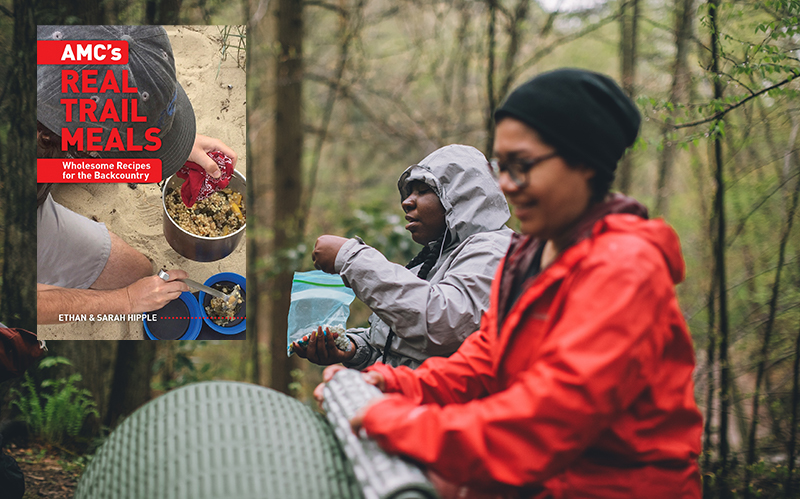
Hiking nutrition boils down to listening to what your own body needs, says Nicole Courmier, a registered dietitian who served as an adviser on AMC’s Real Trail Meals.
During a vigorous day hike, an adult may burn as many as 6,600 calories—but not all calories are created equal. Our bodies require a scientific combination of hard-working nutrients to sustain normal function. What’s the secret recipe? We asked Nicole Cormier, a registered dietitian whose clients include backpackers and athletes (and adviser on AMC’s Real Trail Meals cookbook), to share what our bodies need before, during, and after a day on the trails. The same tips can also apply to other strenuous outdoor activities, like paddling or cycling.
Before You Go
The morning of a hike, Cormier recommends eating a balanced breakfast that contains at least 7 grams of protein, 30 grams of carbohydrates, and at least one fat source. Your personal dietary needs depend heavily on several factors, including your body mass and the strenuousness of the activity. A go-to pre-hike breakfast for Cormier is half a cup of oatmeal or quinoa, one-quarter cup of nuts or seeds, and half a cup of berries.
While You’re Out
Our energy-burning bodies are working overtime when we’re hiking. Our nutrient reserves deplete faster during exertion, requiring conscious replacement of energy-boosting carbohydrates, muscle-building proteins, and slow-burning fats.
Carbohydrates: Carbohydrates are a hiker’s primary source of energy, Cormier says, restoring our glycogen reserves as we go. We should consume 30 to 60 grams of carbohydrates per hour of activity, ideally from whole-food sources, such as dried fruit, nuts, or Cormier’s Super Cookies. (Read the recipe here.) Otherwise, “The body will begin burning muscle, protein, and stored body fats, which isn’t the goal of a hike,” Cormier says. Whole grains, like breads and pastas, and starches, like potatoes and beans, provide long-lasting carbohydrates, although we can get a quick fix from sugars when we require a faster-acting energy boost. Cormier likes honey or maple straws but says energy bars and gels are good lightweight options for many hikers.
Proteins: “If you just have carbs, your body is going to use that up really quickly,” Cormier says. “But if you add a little protein to that, it’s going to slow the rate at which the body turns the carbs to sugar.” Cormier says each meal or snack should contain at least 7 grams of protein, but that amount should increase on moderate to difficult hikes. Meat-lovers can carry turkey jerky (11 grams of protein per ounce) or foil-pouch tuna or chicken (6 to 7 grams of protein per ounce). Individual packets of cashew or almond butter are great, Cormier says, because they are whole foods containing carbohydrates and 5 grams of protein per ounce.
Hydration: Humans can survive weeks without food but only a few days without water. Our body’s metabolic functions rely on it. Hikers should plan to drink between 3 and 5 quarts per day while exerting themselves. The key for hydration, Cormier says, is to sip water throughout the activity. When we wait until we’re thirsty to drink water, we’re more likely to chug it, which makes it harder for our bodies to absorb the benefits. “Water has to digest, just like food,” Cormier says. While there are plenty of electrolyte powders and tablets on the market, Cormier recommends infusing your water bottle with sodium and potassium, available over the counter in tablet or powder form, before you leave home. You can improvise from there: Use coconut water instead of tap water. Add sea salt, honey, or both to give your water a kick of sodium and carbs. Toss in a splash of fresh orange, lime, or lemon juice to infuse your water with Vitamin C, which Cormier says aids muscle recovery.
Bottom line: You, and no one else, are the best judge of what your body needs on the trail.
Post-hike
You may be quite hungry as you roll back into camp or to the trailhead, but avoid gorging yourself on a big, heavy meal right away. “For your body to all of a sudden work overtime digesting that type of meal?” Cormier asks. “It’s just not fair.” Instead, eat a smaller, protein- and fiber-packed snack to hold you over until your body has had a chance to settle down from its effort. Then you can celebrate a day well spent with a moderate meal—“honoring your hunger but respecting your fullness,” Cormier says.